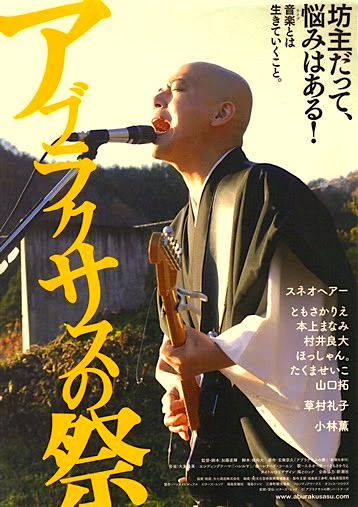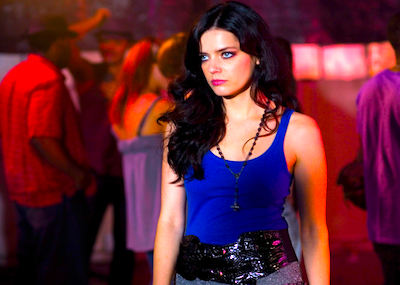By Joe Bendel. This might be the quietest film about punk-rock ever produced. Sure, Jonen could peel the paint off the walls when he was shredding, but his subsequent gig as Buddhist monk is much more sedate. Yet there is a connection between the two that screen writer-director Naoki Katô intriguingly explores in Abraxas (trailer above), which screens during this year’s Sundance Film Festival.
Abraxas will likely shatter most viewers’ preconceptions of Buddhist monks. In addition to his punk-rock past, Jonen is a bit of drinker with a cute but increasingly exasperated wife Tae and young son Riu. Genshu, the resident temple priest, also has an attractive younger wife, making Abraxas quite the recruitment film for Buddhist religious service. Genshu however, is at peace with his path. Jonen by contrast, hears the siren call of the extreme music he used to make. Yet it is not the past glory he misses, but the oneness with sound. He is not looking to fill a void, rather he seeks the void.
 Indeed, the punk-rock playing monk might sound precious, but there is nothing cutesy about Abaraxas. To his credit, Katô never dumbs down the material, crafting one of the more thoughtful and thought-provoking films about Buddhism (or any religion) in quite some time. Despite the importance of punk, it is only heard sparingly in Abraxas. Instead, it is the sounds of rain and even more prominently silence that Katô shrewdly employs to set the tone throughout the film.
Indeed, the punk-rock playing monk might sound precious, but there is nothing cutesy about Abaraxas. To his credit, Katô never dumbs down the material, crafting one of the more thoughtful and thought-provoking films about Buddhism (or any religion) in quite some time. Despite the importance of punk, it is only heard sparingly in Abraxas. Instead, it is the sounds of rain and even more prominently silence that Katô shrewdly employs to set the tone throughout the film.
Still, Katô ‘s film is hardly the cinematic equivalent of a scholarly religious treatise. Dealing with universal issues like loss and the need for belonging, Abraxas would be an excellent companion film to Yojiro Takita’s Oscar-winning art-house breakout hit Departures.
Appropriately Zen-like, the entire ensemble demonstrates ease and restraint in their parts. Though Japanese alt-rocker Suneohair (a.k.a. Kenji Watanabe) gets to rock-out and act a little crazy from time to time, it is still a very grounded and sincere performance. In many ways, Kaoru Kobayashi quietly supplies the heart and soul of the film as Jonen’s senior Genshu, expressing wisdom and tolerance while sounding like a fully dimensional character instead of a cliché in the Kung Fu tradition. Manami Honjo brings a warm, smart presence as Genshu’s wife Asako – while as Tae, Rie Tomosaka supplies surprising depth and nuance in what could have easily been a standard issue nagging wife role.
Abraxas may very well be too subtle to generate the heat it merits in Park City. Yet, it is a richly accomplished film that deserves to find audience (and an American distributor). Highly recommended, Abraxas screens again on Tuesday (1/25), Wednesday (1/26), Thursday (1/27), and Friday (1/28) as part of the World Cinema Dramatic Competition at the 2011 Sundance Film Festival.
Posted on January 23rd, 2011 at 10:01pm.






